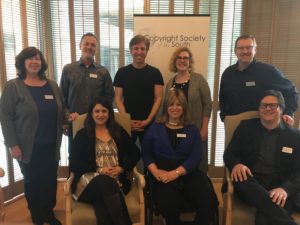Jeff Price talks to the Copyright Society of the South about YouTube’s Partner Program
 On February 28, 2017, the Copyright Society of the South hosted Jeff Price, CEO of the digital rights and YouTube collection firm Audiam. Price is widely recognized in the music industry for founding and running the digital distribution company, TuneCore. Although Price could have a covered a variety of topics in the music publishing and digital rights field, he focused his talk on the ins and outs of YouTube’s partner program for music publishers.
On February 28, 2017, the Copyright Society of the South hosted Jeff Price, CEO of the digital rights and YouTube collection firm Audiam. Price is widely recognized in the music industry for founding and running the digital distribution company, TuneCore. Although Price could have a covered a variety of topics in the music publishing and digital rights field, he focused his talk on the ins and outs of YouTube’s partner program for music publishers.Price spent the first half of his presentation explaining the structure and workflows of digital rights management in the YouTube content management system (CMS). Topics included:
- how making money via your own videos is different from earning revenue from third party videos;
- how videos are monetized with various types of advertisements;
- how the Content ID technology operates;
- how YouTube Red’s monetization structure works; how “art tracks” work;
- the advantages of having a partner agreement with YouTube.
The latter half of the discuss centered around the upcoming change in the relationship of sound recordings and musical compositions in the YouTube system. The most significant problem with YouTube’s current music rights system is rooted in the fact that any YouTube partner can add ownership information to musical compositions; in additional, compositions are created arbitrarily in a number of different scenarios. The result is a proliferation of duplicate compositions, ownership conflicts, and “ghost” compositions that may receive views and therefore revenue, but have no ownership information. To alleviate this problem, YouTube is switching their system to reflect only publishers’ ownership pieces and then link those pieces to sound recordings via ISRCs. Rather than everyone trying to puzzle together every duplicate composition on YouTube’s platform, publishers will now be able to simply assert their ownership of a single share of a composition and link it to many sound recordings. This will require publishers and/or their administrators to keep record of ISRCs if they want to stand any chance of maximizing their revenue on YouTube.
Lastly, Price pitched Audiam’s services, noting that they are willing to help publishers or administrators with digital mechanical rights collection in the US, YouTube collections, and/or finding ISRCs for their compositions. Price added that they do 30 day contracts with no collection periods, so a publisher can terminate the agreement at any time and keep the data obtained by Audiam.
Jeff Price can be reached on Twitter at @TuneCoreJeff . His email address is available to Copyright Society memebers in the Facebook group.
Category: Event Photos, Event Pics
